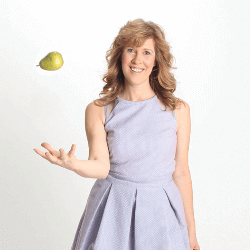

Eighth Grade Navigates Authority on Food
Source/Author: Olivia Segalman, Advancement Associate
May 21, 2020
This year’s theme for eighth grade English was "navigating authority." Students learned different ways of compiling various sources of authority and ultimately learned to make personal decisions after evaluating what their families said, what their communities said, and what their peers said.
During the last trimester of the school year, students read “The Omnivore's Dilemma” with an eye toward Michael Pollan's claims, support and bias. At every stage, students were evaluating the strengths and weaknesses of his arguments.
Since Pollan was only writing about food in America, eighth grade English dove deep into understanding that American food attitudes are not objectively "right" but instead a cultural construct determined by our land and its people. Susi Bean, a volunteer parent with Shorecrest’s International Connection, helped the class get exposed to different views on food, specifically, what is considered to be healthy eating in different cultures and countries, what impact the landscape has on food production, and how people interact with the landscape and cultural attitudes towards food to produce national ideas about cuisine. When Shorecrest pivoted to distance learning in March, Susi lined up speakers who were comfortable sharing via Zoom.
Dr. Angello’s class meet with Shorecrest parents Geoff Cowan, who spoke about food and culture in Australia, Zeina Kantar, who taught students about Lebanese food and the Meditteranean diet, Paula Cooper, who presented on her experience with chilled food production in the UK, and Mandy Blume, a kosher Chef and farmer who teaches children in the foster care system how to grow food and prepare it in the most beneficial ways.
Dr. Angello’s class meet with Shorecrest parents Geoff Cowan, who spoke about food and culture in Australia, Zeina Kantar, who taught students about Lebanese food and the Meditteranean diet, Paula Cooper, who presented on her experience with chilled food production in the UK, and Mandy Blume, a kosher Chef and farmer who teaches children in the foster care system how to grow food and prepare it in the most beneficial ways.
Thank you to our informational guest speakers for providing students with a diverse view of food production world-wide! Dr. Angello shared a few highlights from the presentations:
- Geoff Cowan pointed out that most of Australia is very sparsely populated and not especially arable. He also talked about the enormous ethnic diversity in Australia in the wake of immigration waves from south Asia in the 19th century and Europe after the World Wars. We learned some Australian food slang ("tucker" = food, "tomato sauce" = ketchup) and that most Australians go out to eat very rarely compared to Americans. Most Australians can cook lots of different kinds of ethnic foods. The foods of southeast Asia are particularly popular.
- Zeina Kantar spoke spoke with love and passion about the massive spreads provided on Lebanese tables and how feeding guests is the most important expression of hospitality. Zeina showed videos of her family table, laden with grains, hot and cold salads, warm breads and grilled meats. She emphasized the abundance and variety of vegetable dishes as the foundation of Mediterranean eating - and then she cooked for us! Zeina prepared fatteh, a layered dish made with tender chickpeas, fried pita triangles, and warm, spiced yogurt, topped with sizzling pine nuts toasted in melted butter. She shared her recipe for this dish and for traditional hummus.
- From Paula Cooper we learned how Britain's tightly packed population and small landmass (the opposite of Australia!) meant that food can be easily and quickly distributed to the entire country from just a few, central locations. Because of this only a few major supermarket chains control the market, and they all provide enormously diverse selections of fresh, chilled foods - as opposed to the frozen foods available in US supermarkets. Essentially, the "industrial" food chain in the UK is much closer to the "local sustainable" model in Pollan's book. People in the UK cook at home just as often as people in Australia, but they eat from a much higher proportion of "ready meals" and chilled, fresh foods - like what you find at Fresh Market in the refrigerated deli case, but of a very high quality and with a wide selection of options. One grocery store that Paula shared could offer as many as 50 different chilled (not frozen) pizzas on any given day! We also learned about the UK's "traffic light" system for nutritional labels, similar to those used by SAGE.
- Mandy Blume is a certified nutritionist. She spoke candidly about the challenges of raising your own food, including slaughtering and eating animals that you have loved and cared for. She also shared some of her home recipes and methods, including roast chicken with greens and potatoes, explaining how bitter greens combine with potatoes and fat ("Always use fat from a food") help our bodies uptake all the nutrients from the greens… and makes them taste better. Her photos and warm manner drew the students right in, and many of them incorporated her lessons into their essays.
Students were encouraged to use evidence from these speakers to reinforce arguments for essays at the end of the unit. The essay prompt was, "Which of Michael Pollan's four food chains would best feed your household: Industrial, Industrial Organic, Local Sustainable or Hunter Gatherer?
























